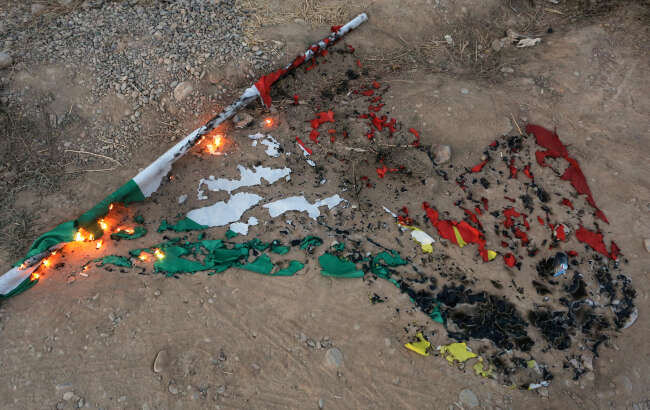
A Kurdish flag burned in Kirkouk on October 16 2017 – STRINGER/REUTERS
The Economist published a piece this week on the actions by Iraqi forces against Kurdish interests in the Kurdish region of Iraq after a referendum for independence from Iraq took place recently. With dwindling ISIS control of territory in Iraq and Syria, the interests of those who have allied themselves with Iran, Saudi interests and US interests have already begun the rush to secure territory for a future Cold War. While combat between the Iraqi army and Kurdish forces was limited in the recent move by Iraq’s government to secure economic and strategic interests in the Kurdish region, actions by the pro-Iranian government in Baghdad seems to be working in conjunction with Iraq’s neighbours to isolate and nullify Kurdish forces and interests in the Kurdish part of Iraq.
Kurdish forces and its people have been the tip of the spear in many ways against ISIS and extremism in the region, despite getting little physical help early on and limited help in combatting extremism. The question of Kurdish independence has always existed, but with independent Kurdish forces taking on the role the Iraqi Army fled from a few years ago in their region, the Kurds are in the strongest position they have had in a long time to defend independence if they wished to enforce their claim. Intellectuals like Bernard-Henri Levy wish for the world to focus on those that have helped the world, and their role in this conflict has set them apart distinctively in human history. With Kurdish Peshmerga fighting massive odds against ISIS forces and being the government that took steps to protect minority communities from genocide, it seems as if fairness for Kurds were to take place, their destiny should be theirs to determine as their safety has been theirs to secure since 2014.
The Economist author points out that the attack on the Kurds may have to do with their faith being different than that of Iran and their allies in Baghdad’s government. While that is the case to some degree, the actions taken against them in the last few years were done by those of a different culture as opposed to a different perspective on faith. The view that the Kurdish part of Iraq is more liberally focused and their protection of different faiths and minority cultures also need to be considered in assessing the reasons why Kurds seem to be the target of everyone in the region in the future post-ISIS era. A miscalculation of divisions in the region goes further in error, as if the Sunni-Shi’a divide is going to be the next major catalyst in endless wars in the region, the Sunni Arabs will be put into a position of having to constantly defend themselves being in a weaker position in their native communities. An expansion of conflict seems to signal that the end of one war is the beginning to the next major war. With a lack of understanding of the region, it seems as if the Kurdish Peshmerga will have to also continually defend their communities in the future as well.